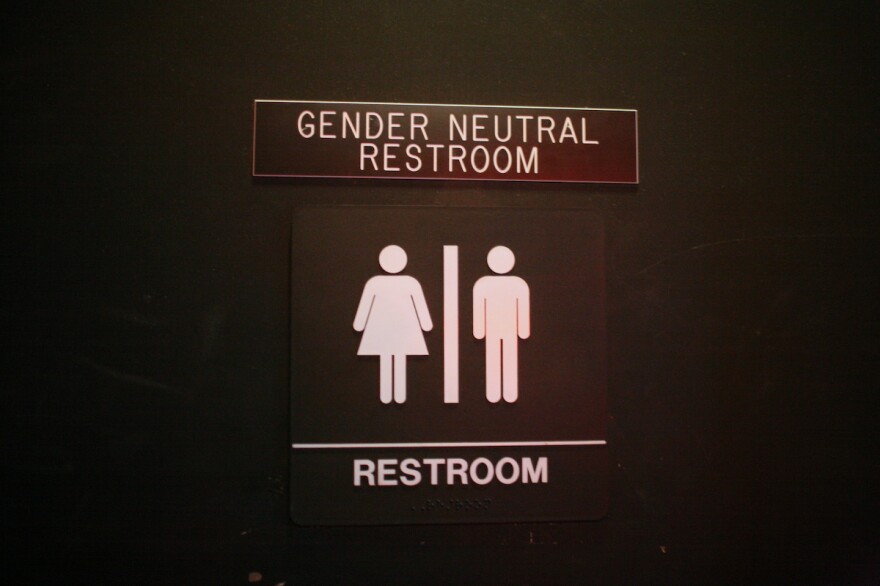At the Texas Capitol in Austin, battle lines are sharpening around one of this year’s biggest fights over social issues. It’s a battle over bathrooms, specifically which bathrooms transgender people should be allowed to use.
Supporters and opponents have already been lobbing attacks. Here’s what you need to know.
What are we talking about when we talk about so-called bathroom bills?
The bills take different forms in different places, but all of them in one way or another limit or prohibit transgender people from using bathrooms of their choice. In North Carolina, for example, it’s illegal to use the bathroom that doesn’t match the sex marked on one’s birth certificate.
"In Texas, the proposed legislation is a bit more limited. Senate Bill 6, proposed by Texas Sen. Lois Kolkhorst, would mandate that transgender people use bathrooms, locker rooms or other sex-segregated intimate spaces in public schools, government buildings and public universities based on 'biological sex' instead of their gender identity. It does not mandate what private businesses or entities can and can’t do.
"The bill would also block local nondiscrimination ordinances that guarantee transgender people the right to use the facilities that matches their gender identity."
Why do proponents say this is needed?
"Lt. Gov. Dan Patrick emerged this spring as the chief advocate for a so-called bathroom bill. He says it’s a privacy issue and a safety issue – the bill is called the Privacy Protection Act. He’s said he’s afraid that transgender non-discrimination protections that allow transgender people to use bathrooms or locker rooms that correspond with their gender identity might entice sexual predators to pretend to be transgender in order to prey on women and girls in bathrooms.
"Patrick also frames this as a fight against a liberal agenda. At a press conference announcing the legislation, he said, “You can mark today as the day that Texas is drawing a line in the sand and saying no. The privacy and safety of Texans is our top priority, not political correctness.”
What do opponents of the legislation say?
"Transgender advocates are really bothered by this safety claim. They say transgender people aren’t predators, and there isn’t evidence that more crimes occur when transgender people are allowed to use the bathroom they’re most comfortable with. Also, they point out, sexual assault remains a crime."
The business community in Texas has come out strongly against the legislation as well.
"The Texas Association of Business and visitors bureaus across the state say anti-LGBT legislation like Senate Bill 6 will hurt tourism because people could Texas as a discriminatory place. That, they contend, will make be harder to attract high-profile sports events or big conventions if organizations aren’t sure their fans or attendees will feel welcome. They also say it’ll make it hard for employers to attract top talent to the state, and that businesses will look elsewhere when they plan to relocate or expand.
"House Speaker Joe Straus says that’s his concern. 'I think we should be very careful about doing something that could make Texas less competitive for investments, jobs and the highly skilled workforce needed to compete,' Straus told the Texas Association of Business, adding that it’s his personal view."
A Texas Association of Business study projected major economic fallout from the legislature, but those numbers have come into question.
"The study, conducted in conjunction with graduate students at St. Edwards University in Austin, projected that Texas could face between $964 million and $8.5 billion in lost GDP, and up to 185,000 lost jobs if the state passes anti-LGBT legislation.
"PolitiFact Texas looked into those numbers, and found serious problems with the data that was used to support those conclusions. The fact-checking website labeled the claim 'mostly false,' but it also held up the basic thrust of the business group’s argument: that Texas will likely see a detrimental economic impact if it goes forward with anti-LGBT legislation.
"Lt. Gov. Dan Patrick trumpeted the 'mostly false' claim, and panned the underlying assumption that economic damage would be caused by the legislation.
"But on Friday, the National Football League seemed to give credence to the claim that the anti-LGBT laws would have an effect. In a statement to the Houston Chronicle, the league said that laws considered discriminatory would be a factor taken into consideration when awarding future Super Bowls."
So where does this go from here?
"This cues up a potential fight between the House and the Senate on this issue. Patrick, who leads the state senate, has said he thinks his chamber will pass the bill. But it’s an open question if it’ll even come up for a vote in the House. Gov. Greg Abbott has been largely silent on the issue.
"It also exposes a tension between the Republican Party’s wing that is motivated more by social issues and the more business-focused side of the party.
"Whatever happens, this is an issue expected to continue to generate a lot of activity before the session is over."






